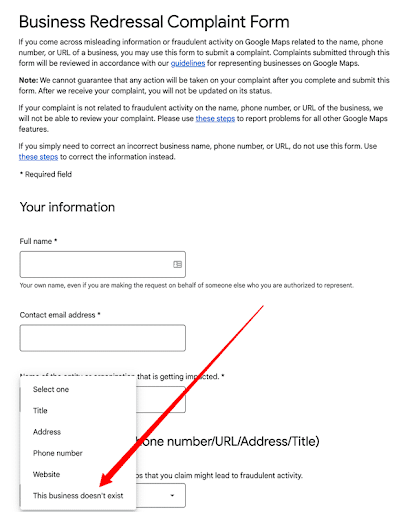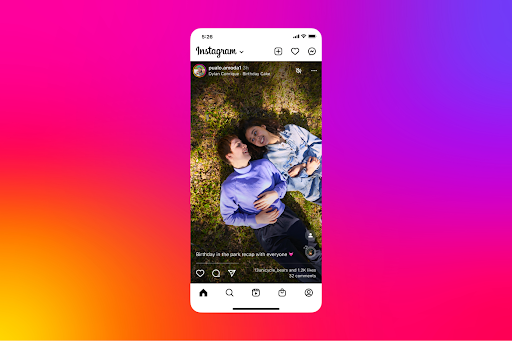Webinar Recap: Brand Loyalty Dies as Search, Social, and Reputation Converge
Local Memo: Google Adds Guidelines for Virtual Restaurants

In this week’s update, learn about Google’s new guidelines for virtual restaurants; Facebook’s removal of location tracking features; a new flag for non-existent businesses; Yelp tactics for sharing positive reviews; Google’s many uses of machine learning in search; and Instagram’s new full-screen home feed.
Google Adds Guidelines for Virtual Restaurants
Virtual restaurants have become a popular option in the last couple of years, with digital brands and influencers like TikTok and MrBeast looking to make inroads into local markets. Well-known restaurant brands such as Chili’s, Applebee’s, and Outback Steakhouse have used the concept to launch new brands and products with a delivery-first approach that has been successful with pandemic consumers.
Now Google has significantly updated its guidelines for virtual food businesses who seek to create Google Business Profiles in order to capture the attention of local consumers. Virtual restaurants are permitted to create their own listings but must adhere to these new guidelines. Google makes a distinction between “co-located food brands offering pick-up,” which must display signage for both businesses and can list an address for both, and “delivery-only food brands” (the more typical case for virtual kitchens), which must hide their address and list a service area.
Delivery-only food brands must also have distinct packaging and a branded website. Multiple virtual brands are permitted at one location, but might be asked to provide additional proof of authenticity. Facilities like Doordash Kitchens that exist only to host virtual restaurants may also manage their own separate Google listing.
Facebook Scales Back Location Tracking
In a move that seems designed to mimic the privacy-forward stances of companies like Apple, Meta has announced the deprecation of several Facebook features that depend on tracking user location, including Nearby Friends, weather alerts, and Location History. The features will be disabled as of May 31, 2022, and all user data gathered to power them will be deleted as of August 1. In a statement provided to Andrew Hutchinson at Social Media Today, Meta claimed the features were being removed due to low usage. But Hutchinson speculates that Meta may in fact be trying to reduce the complexity of location tracking notifications sent to Apple users, and in addition may be responding to increased pressure, especially from the European Union, to cut down on invasive user tracking.
Google Users Can Now Flag Nonexistent Businesses
In a small but significant update, Google has added the option “This business doesn’t exist” to its Business Redressal Complaint Form, the form provided for users to report fraudulent content on Google Maps. Previously, Google only permitted users to flag the business name, phone number, address, or website as fraudulent; now, users can specify that the business in question does not exist at all.
Especially prevalent in certain industries such as locksmiths and attorneys, spam listings can have a major impact on legitimate businesses, sometimes occupying multiple spots in local rankings and directing business to a single lead broker. Google does act to remove spam reported through the redressal form, and now users have a more direct method for reporting that a spam listing references a nonexistent business location, one of the most common forms of listing spam.

Image courtesy Search Engine Land
Yelp Encourages Businesses to Share Reviews
In a new episode of Yelp’s podcast Behind the Review, Elizabeth Sexton, marketing director at Aligned Health, offers three suggestions for businesses wanting to gain additional value from positive reviews. The first is to share reviews publicly at your business location. Sexton says that Aligned Health posts positive Yelp reviews at all of their locations, and customers have shared that reading the reviews inspired them to share their own positive experiences. The second recommended strategy is to share positive reviews on social media, after securing permission from the reviewer. Sexton has found this strategy helps to build online community engagement. Finally, great reviews should be an occasion for internal teams to celebrate. Reviews shared with your team help to foster a culture of excellent customer service.
How Google Uses Machine Learning in Search
A post from Dave Davies on Search Engine Land offers insight into Google’s usage of machine learning to power its search algorithm. The post provides basic definitions of terms used in machine learning, such as “model,” “corpus,” and “neural network.” It goes on to provide a summary of the purpose and current usage of major Google algorithms and machine learning models, including RankBrain, BERT, LaMDA, KELM, and MUM.
Of these, RankBrain, first launched in 2015, has caused the most significant upheaval in Google’s approach to search. RankBrain is the algorithm that allowed Google to deploy the Knowledge Graph in search and to move from “strings to things”; in other words, from an approach to search based on text matching to an approach based on an understanding of the interrelationships between entities. BERT, launched in 2019, has also been important in improving Google’s ability to understand complex phrases. LaMDA, which has been previewed but is not yet live, will help chatbots keep up when conversations change direction, and will likely improve Google’s understanding of sequences of search queries. KELM is a model (also not yet live) that will help to fight against misinformation by comparing web content to trusted sources. Finally, MUM is a multimodal technology that helps to cross boundaries by understanding the content of images and videos as well as working in multiple languages.

Image courtesy Search Engine Land
Instagram Tests Full-Screen Feed Display
In news that will surprise no one, Instagram has officially begun testing a full-screen display of its home feed. The interface will provide a TikTok-like immersive experience, where users will immediately encounter full-screen content upon logging in. Meta recently reported that Reels, the short video format that mimics TikTok’s videos, account for more than 20% of the time people now spend on Instagram. In fact, on Facebook the format is even more popular, with Facebook users now spending 50% of their time on the platform watching video content.
Google is also pushing YouTube in the direction of short form video with YouTube Shorts. Shorts have seen 4X growth in the past year and are now viewed 30 billion times per day, according to Google.

Image courtesy TechCrunch




